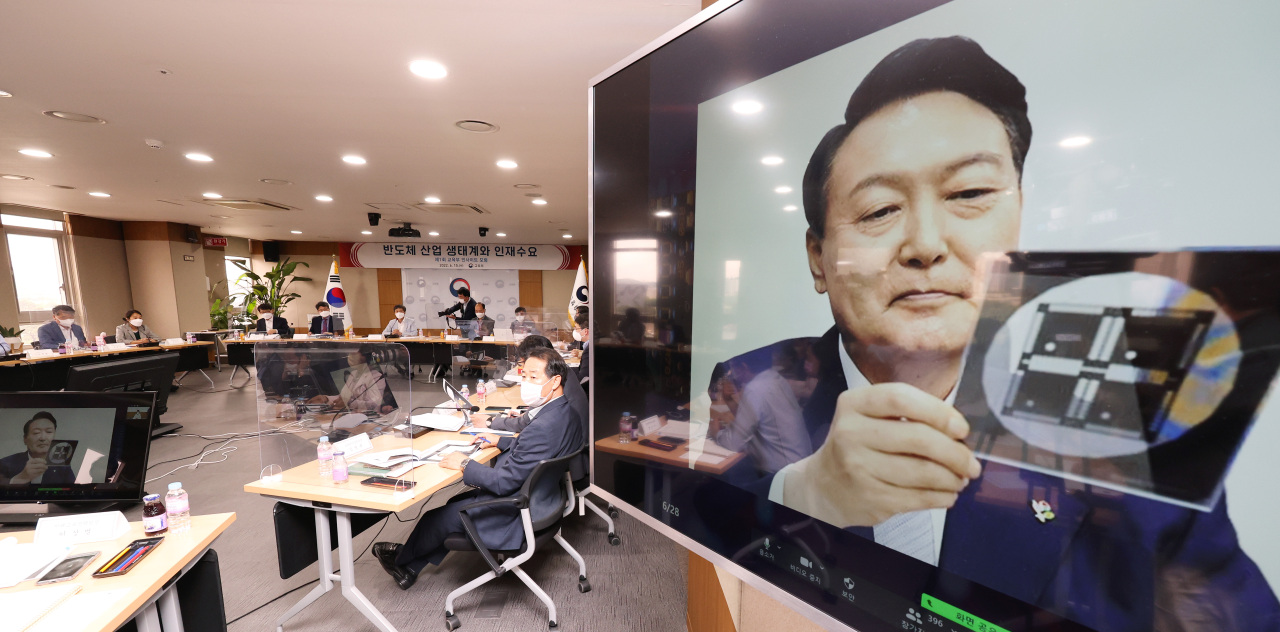 |
Workers at Education Ministry listen to a lecture given by professor Hwang Cheol-seong on the semiconductor industry held at the governmental complex in Sejong, Wednesday. (Yonhap) |
The Education Ministry is rushing to step up its efforts to nurture next-generation talents for the semiconductor industry, following President Yoon Suk-yeol’s comments last week.
At a Cabinet meeting held last week, Yoon called for special measures to boost the industry, specifically asking the ministry to develop policies to expand the talent pool for semiconductor experts. He said the current limit on the university student quotas was an impediment to training sufficient graduates.
Since then, the ministry has been scrambling to draw up and revise related measures.
On Wednesday, the ministry held an open debate to discuss the current conditions of the semiconductor industry.
“Our semiconductor industry will be short 5,565 workers over 10 years until 2032,” professor Hwang Cheol-seong from Seoul National University said.
“It is important for businesses and universities to cooperate to nurture experts,” Hwang said. “Also the ministry should support professors studying semiconductors to conduct sufficient research in order to nurture new talents.”
“It takes more than two years to reeducate graduates (when they start working) as there is a gap between university education and actual production,” Kim Hyung-hwan, vice president at nation’s leading semiconductor maker SK Hynix said. “Though business are leading the establishment of contracted departments at universities, it is difficult to hire professors, and covering the expenses is also overwhelming.”
The ministry’s special task force on increasing the number of semiconductor experts held its first meeting the same day. Consisting of both governmental officials and private experts, the team will set agenda for increasing the number of experts in high-tech fields including the semiconductor industry, and check later to see if the policies are meeting industry needs.
Since Yoon made the orders last week, the ministry has also been looking into increasing the enrollment quotas for semiconductor departments at universities. The ministry originally keeps a tight control on the enrollment quotas to maintain academic and regional balance.
Meanwhile the Education Ministry has been criticized for rushing to revise its measures following the president’s requests.
“Education is not factory production. It is not an area that produces immediate output from input,” Rep. Kang Min-jung from the Democratic Party of Korea who is a member of the Education Committee at the National Assembly wrote on her social media account. “(The ministry) should make policies based on a more integrated, longer perspective.”
Also, universities in regions other than the greater Seoul area expressed concerns that the new expansion of the student quota may speed up the imbalance of education, leading to lesser students in the region.
“The lift on the limit of university student quotas will be similar for universities in the greater Seoul area and outside. But there will be more expense support for the universities outside of the metropolitan area,” Prime Minister Han Duck-soo said last week in response to the concerns.
Though a major player in semiconductors, Korea has been suffering from a labor shortage in the industry, partly from the outflow of experts to work abroad.
According to research study conducted by the Ministry of Trade, Industry and Energy and the Korea Institute for Advancement of Technology, there were 179,885 employees in the semiconductor industry in Korea as of 2020, 1,621 short of the level needed for proper management.
The Education Ministry plans to announce the road map for nurturing semiconductor experts and high-tech fields in July.
By Im Eun-byel (
silverstar@heraldcorp.com)








